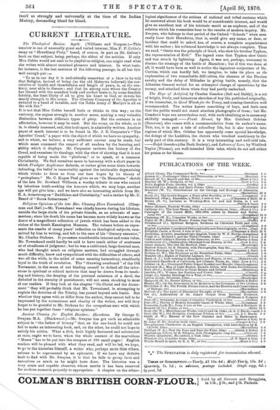Ancient Classics for English Readers : Herodotus. By George C.
Swayne, M.A. (Blackwood.)—Mr. Swayne has got such an admirable subject in "the father of history" that, on the one band, he could not fail to make an interesting book, and, on the other, he could not hope to
satisfy his critics. What a dish, both highly flavoured and substantial at once, ought we to have, when the whole essence of the marvellous
" Muses " has to be put into the compass of 180 small pages ! English readers will be pleased with what they read, and will be led, we hope, to go to the historian himself, a writer who, perhaps more than others, refuses to be represented by en epitomist. If we have any definite fault to find with Mr. Swayne, it is that he fails to group facts and narratives as much as he might have done. The historian was a very acute and capable observer, whose merits it has been reserved for modern research properly to appropriate. A chapter on the ethno- logical significance of the notions of national and tribal customs which lie scattered about his book would be of considerable interest, and would give an excellent test of his intrinsic merit as an explorer, and of the relation which his researches bear to the results of modern inquiry. Mr. Swayne, who belongs to that period of the Oxford "Schools" when men really knew their Herodotus, that is, could give any name, or date, or incident that could be asked, has, of course, a complete acquaintance with his author ; his collateral knowledge is not always complete. Thus we read, " Osiris was the principle of Good, who slew his brother Typhon, the representative of Evil." The legend runs that Typhon slew Osiris and was struck by lightning. Again, it was not, perhaps, necessary to discuss the strategy of the battle of Marathon ; but if this was done at all, it would have been as well to notice the ingenious conjecture of Dr. Curtius, which can hardly fail, we imagine, to take its place as the explanation of two remarkable difficulties, the absence of the Persian cavalry and the delay of Miltiades in giving battle, namely, that the Athenian General waited for an attempted change of operations by the enemy, and attacked them when they had partly embarked.


































 Previous page
Previous page